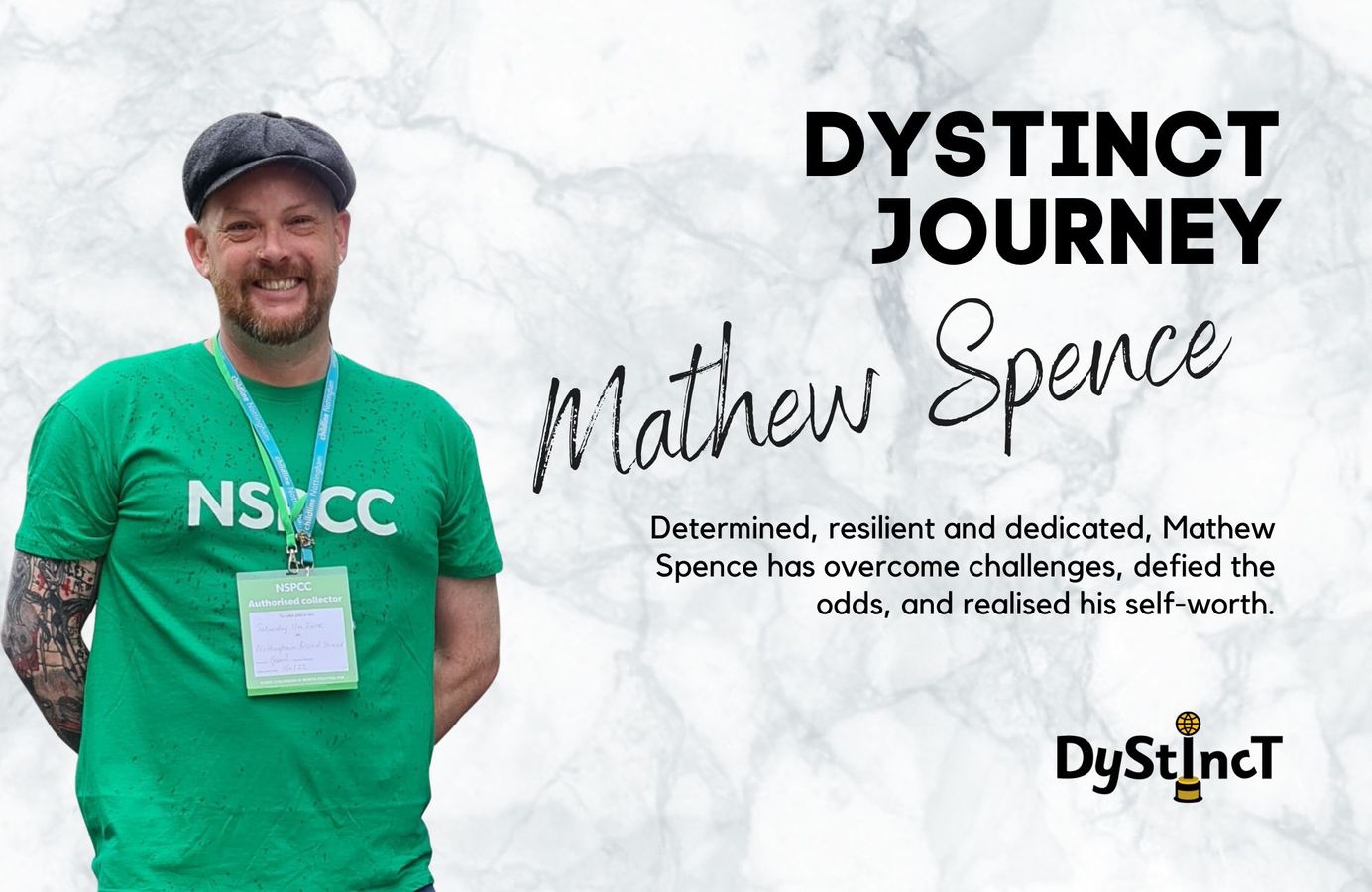
Issue 18: Dystinct Journey of Mathew Spence
Mathew Spence overcame the challenges of dyslexia, ADHD, and ASD, defied discouraging predictions, and earned a psychology degree at the age of 42. He is now planning to establish a counselling service for individuals on the autism spectrum.
Determined, resilient and dedicated, Mathew Spence has overcome challenges, defied the odds, and realised his self-worth.
Despite early setbacks and discouraging predictions, Mathew Spence has defied the odds, overcome challenges, and carved a unique path to personal and academic achievement. His journey is a testament to the invincible spirit of individuals with dyslexia.
Mathew's Story
Mathew's Story
Born in March 1981, Mathew Spence spent his early years in Gate Burton, a peaceful small village in the historic countryside of Lincolnshire. His educational journey was marked by initial struggles, but it wasn't until the age of 12 that he was formally diagnosed with dyslexia. Mathew Spence's path through the education system was increasingly complex due to underlying neurodiversities that were not fully recognized until much later in life. Alongside his dyslexia, it was only in 2023 that he received a diagnosis for combined ADHD and ASD traits.
At School, Mathew faced difficulties in many subjects, but English proved to be the toughest due to his struggles with spelling and grammar. The daunting task of reading aloud in class—words jumbling and sometimes seeming to vanish—only intensified his struggle. Beyond the academic struggles, Mathew also faced social hurdles; being bullied became a part of his daily life. Both classmates and family members failed to understand his condition, which only added to his challenges.
Frequently labelled as 'thick,' Mathew experienced a profound effect on his self-perception and confidence. The rigidity of school schedules and the often-limited empathy from educators towards Mathew's unique learning needs posed yet another layer of difficulty, which significantly hindered his willingness to seek the assistance he needed. "By the time I was 13, I knew if I asked a question, I would end up being sent out of class or punished. So, I stopped asking for support. I regularly had to write lines as a way to improve my spelling, but this usually resulted in me having to write even more lines due to my lack of engagement with the task and the inevitable spelling mistakes I made. By this age, I also learned when it was my time to read aloud in class, causing a fuss and being sent out would mean I wouldn't get ridiculed in class for my poor reading skills, which was a win for me," shares Mathew.
Mrs Irvin helped me believe even if I failed, I could be proud if I tried and put my effort forward.
Within the challenging school environment, one teacher, Mrs. Irvin, emerged as a guiding light for Mathew. Her empathy and encouragement helped him to recognize the value of effort and persistence. "She had so much compassion and understanding. She helped me believe even if I failed, I could be proud if I tried and put my effort forward and would be surprised with the outcomes if I worked hard. Thank you, Mrs Irvin."
On the home front, Mathew's journey wasn't any easier. His mother grappled with her own emotional and mental health issues while his father, a long-distance truck driver, was frequently absent due to the demands of his job. However, Mathew and his dad shared a special bond through their work on old cars. These moments with his dad were precious to him. Mathew absorbed knowledge through action and observation, learning more from the hands-on guidance of his father than he ever could from textbooks. By the time he was 12, he was already able to take apart and put together an engine all by himself. "I loved cars, anything about them. I especially enjoyed breaking things down and learning how they worked. In my family, I am famously known as one of the only children in the world to break the indestructible Tonka toy. It took me about an hour to get it into its working components. I found a way to dismantle it without being destructive. I spent countless hours working on old engines, and by the time I was 12 I had my first car, an Austin Mini."
By twelve, Mathew had not only acquired an Austin Mini but had also dived into the world of Mini Stock racing at Blyton Raceway, competing until he was sixteen. The open spaces of the countryside, with its fields and old farm tracks, served as his proving grounds. Despite the occasional trouble with the law for driving without a license, these experiences only strengthened his resolve and passion. Observing the inner workings of machines laid out before him unlocked his ability to learn and replicate complex processes.
I learned that if I could use my hands I could comprehend many things, and if I could see how things worked, I could replicate my learning.
Mathew's official diagnosis of dyslexia at age 12 came with an unsettling prediction. Mathew and his mother were warned that he would likely fail in all his GCSEs and, most alarmingly, was at risk of ending up in the criminal justice system. Ignoring the grim predictions, Mathew poured his energy into his studies with unwavering dedication.
This post is for paying subscribers only
SubscribeAlready have an account? Log in


